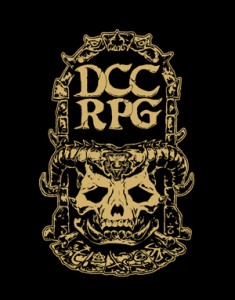When the D&D Next playtest first was released I was excited. Loyal readers of the blog know I skipped D&D 4e. My read through of the rules left me less than impressed and it went against the grain of what I thought D&D was in several ways. Reading play reports from other people seemed to confirm this. The era of D&D 4e was spent with me playing Pathfinder. I have no axe to grind against D&D 4e, I fully appreciate that many people enjoyed the system and anything that brings more people to RPGs in general is a good thing.
Back to the initial playtest release. I read the whole thing and I was quite enthused. It really seemed to get back to a rules-light feel. I was excited to get some playtests going. Scheduling issues got in the way about that time and soon the second iteration of the playtest was out. Terminology was starting to creep in that turned me off a bit to the direction things appeared to be heading. Healing sticks out to me as a big point of contention for me. There were certainly others.
As the playtests kept coming out I started to feel less and less like D&D Next was going to be for me. The complexity went up and it seemed to drift from what the first playtest was significantly. My eyes began to glaze over as I tried to read later iterations of the playtest.
The thing the D&D Next playtest taught me is that I wanted a rules-light ruleset. The first iteration if the playtest taught me that. This is what really led me to start looking at systems of the OSR variety.
First was Dungeon Crawl Classics RPG. I bought DCC RPG because of the art. I stayed because of the craziness that is DCC RPG. I really enjoy DCC RPG because I think it throws those that are long time gamers off their game. The randomness makes us think again. We can’t assume things will work as expected. It makes things fresh, it makes things crazy.
And while I really like DCC RPG, I am not sure it is ready to be my default game. One, because my son who I tend to play RPGs with on the weekends is not that into it. He is not a big fan of the randomness, he wants his spells to work as he expects them. I get where he is coming from. I’ve cast magic missile as a wizard hundreds of times. DCC RPG makes magic missile fun again because I never know exactly how it is going to manifest itself in DCC RPG! But for my son, still new to RPGs, he wants magic missile to work the way the spell description says it will. He doesn’t need the randomness to that degree in his game.
OSR Rule Sets
That left me to finding a set that let me play a more traditional “D&D” game. This area is filled with excellent possibilities. Castles & Crusades, Labyrinth Lord, OSRIC, Basic Fantasy, Blueholmes, Swords and Wizardry, and more. All of these rule sets are light in nature and have a classic D&D feel. I am still making my way through them to find my default rule set, but all of them give me the feeling I had when I first read the D&D Next playtest.
D&D Next?
Several folks have said if I liked the first iteration of the playtest then to be patient as that will exist in the core form of D&D Next. But why wait? I don’t *need* D&D Next to get the feel I want from a D&D game. There are many excellent options out there already!
There is no need to wait another year to see what is released as the next version of D&D. Between the OSR rule sets I mentioned above there are already many rules that hit the feel I want and at a very reasonable price (sometimes free).
The basic D&D Next is going to have to compete against these already released products. Products that are already excellent and available. Even if I wanted to play the D&D brand name, I could easily grab the Moldvay PDF from RPGNow and use it. It is out now and hits the feel I want in a fantasy genre game. D&D Next is irrelevant to me. The first playtest packet showed me the feel that I wanted. It also made me realize I do not need to wait for D&D Next to be released to get that feel.
I will take another look when D&D Next is finally released. For now though, I already have enough OSR systems that hit the target for the game I want to play. I am not sure what niche D&D Next would fill for me.



That’s exactly where I am. I haven’t even looked at D&D Next. I’m not enamored of 4E and I’m even wary of Pathfinder as the older I’ve gotten, the less I like rules-heavy systems (my brain doesn’t have time to remember all that stuff!). People ask me if I’m going to run D&D Next when it comes out and I say “Why? I have 4+ editions of D&D right there on my shelf. The Rules Cyclopedia (and B/X) and 2nd ed. AD&D are exactly the flavor of D&D I want, so why should I hope on the edition treadmill again?”
When D&D 3E came out, 2nd ed. was showing it’s age and it was hard to find players. It seemed to incorporate a lot of things that we were already houseruling (and added a few things we weren’t, like ascending AC and feats). So, we switched. 4E came out and radically changed a lot of other things. It was too far for me. After playing 3.X throughout its lifecycle and giving 4E a fair chance, I realize that I was happiest when I was playing & running AD&D.
Of course, that’s not stopping me from running Pathfinder for my next campaign (starting next week!)….for now.
4e certainly didn’t strike my fancy. Pathfinder worked more of a way to keep playing 3e which I was still enjoying at the time. Actually, the more I think about it, the other thing Pathfinder did was take 3.x back to basics. Pathfinder was great fun with just the core rulebook. It felt simple because I was so used to the growing complexity of 3.x. I think in a lot of ways that contributed a lot to my attraction to Pathfinder initially.
Pathfinder has grown a bit unwieldy over time as well, in my opinion. My eyes sort of glaze over as people start talking about their “builds”.
I think when I play or run Pathfinder again I just need to make it core and APG only for sources.
I’m feeling somewhat the same.
I enjoyed 4E to a degree. I liked how it leveled the playing field class wise and made every class interesting to play at all levels. That being said, it was very combat focused.
I’m simply not a fan of 3.x and Pathfinder for the complexity of character management.
With all that out of the way, I too enjoyed the stripped down feel of the first public playtest. As a full supporter of 3.x and 4E I know how each new edition must downplay the previous to a degree and the early playtest certainly did that. As new playtests came out, and from following designer blogs, it’s clear that 4E left an impression on them, and more than that their blog surveys were probably skewed by a more net savvy or active group where 4E was their first taste of D&D. So why abandon $400 in books only to bring back many of 4E’s concepts in a new edition?
To satisfy that Old School itch we have DCC and many other (often free or seriously cheap) OSR clones.
If I want quick and fast I have Dungeonslayers or BareBones.
If I want heavy roleplay I have Dungeon World.
I will support the core books of 5th edition only because it’s what I have done and will always do. I will be hesitant to buy more unless my gaming groups go whole hog into it. There are simply soo many choices out there, each filling a niche, itching that scratch already.
Definitely very similar lines of thinking. I actually think if WotC was going to move forward with a new edition they would have been better to continue pushing the boundaries. Not re-hashing systems they have already released. I say that even as being a proclaimed non-fan of 4e.
I think where Next will have a clear advantage over the OSR is in terms of financing. WotC can afford to make it pretty, they can push out product regularly, they can reach the masses – none of which is possible for a one-man band like BLUEHOLME™. While I’m sure the OSR won’t be hurt by the advent of Next, neither do I think Next will suffer. If anything, my hope is that this will turn into a win-win for both groups.
I am not sure the ‘pretty’ artwork will make much difference for OSR fans. A lot of us tend to like the older style line-art or dislike busy background pages.
I definitely hope it is a win-win though. While I have my gaming preferences, I think having plenty of options is good for everyone.